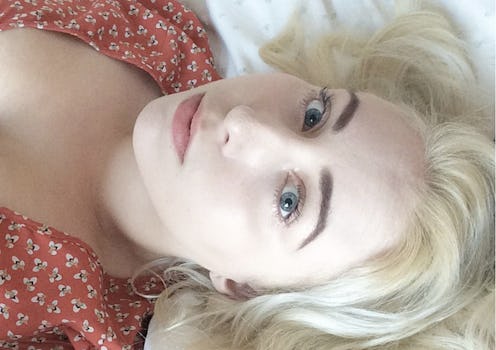Fashion
7 Phrases To Avoid If You Wanna Be Body Positive

Being body positive is a journey, not a destination. And as the movement continues to grow, many of us are learning more and more about the effects and meanings of both body-positive words and anti-body-positive words. From discussions over the #droptheplus campaign by Stefania Ferrario and Ajay Rochester to uproar over Instagram banning #curvy (now, thankfully, the ban has been lifted), there have been many debates regarding plus-size-related terms in particular. The terms we use to address ourselves, like reclaiming "fat" or "plus size," may not be the terms that others wish to be addressed by. And we need to respect that not everybody is comfortable with the same descriptors.
Ideally, we should be conscious of how those around us wish to be described, and use only those terms when speaking to or of them. But it can get tiring and difficult as different arguments transpire. Too often, have I called myself fat, only for my friends to think I'm using fat as a negative and try to comfort me by replying, "Oh you're not fat!" I am fat and I love it, but some women are fat and hate the word, which is completely acceptable and understandable. Overall, though, there are some words we must completely remove from our vocabularies if we're going to continue calling ourselves body-positive.
1. "Flattering"
This is a major pet peeve for me. More often than not, if someone is describing an item of clothing as "flattering," they mean "slimming." I actively try to avoid looks that glossy magazines claim are "flattering" for my "plus-size" frame.
2. "Curvy"
Of course, some fat women do actually have curvy hourglass figures, and they love this phrase. But some fat women don't, and using this "flattering" term to describe all fat women is actually a negative, as it shames the fat people who don't adhere to the socially accepted plus-size hourglass shape. Plus, there are many people who are curvy but not at all fat, so it's simply not an accurate synonym for "plus size."
3. "Perfect Silhouette"
Ashley Graham recently used this phrase in an article about plus-size styling tips, but what exactly is the perfect silhouette? Why must some fat women force themselves into waist trainers and shapewear to achieve silhouettes that don't come to them naturally? The issue here is the concept of the perfect silhouette, considering the word "perfection" is inherently meaningless, and our takes on things like beauty and attraction are so hugely subjective and individual.
4. "There's Nothing To Her"
Just as we should avoid fat-shaming terms, we should be avoiding thin-shaming ones, too! Phrases like this imply that thin women are worthless because they weigh less than plus size women.
5. "Real Women Have Curves"
Following that train of thought, women come in all shapes, sizes, and degrees of curvaceousness, but no one body type should automatically be deemed the "best," or the "most legitimate." Implying that "real" women have curves belittles all the women whose bodies don't adhere to ridiculous standards of femininity.
6. "Overweight"
Although this is arguably a medical term, when used outside the realm of medicine, it simply implies that there's a socially acceptable weight, and that anybody plus-size is over that. Personally, I find it to be body shaming when used outside of the doctor's office. It's also adding to the stigma that being plus size is inherently unhealthy, which just isn't true.
7. "Big Boned"
I have so many issues with this phrase. The word "big" makes me feel clumsy and gigantic, like I'm expected to be tall if I'm fat, when I'm simply not. My bones aren't big. What's making me big is the fat on my body. And that's OK!
Images: princessgeorgina/Instagram; Giphy; Photobucket